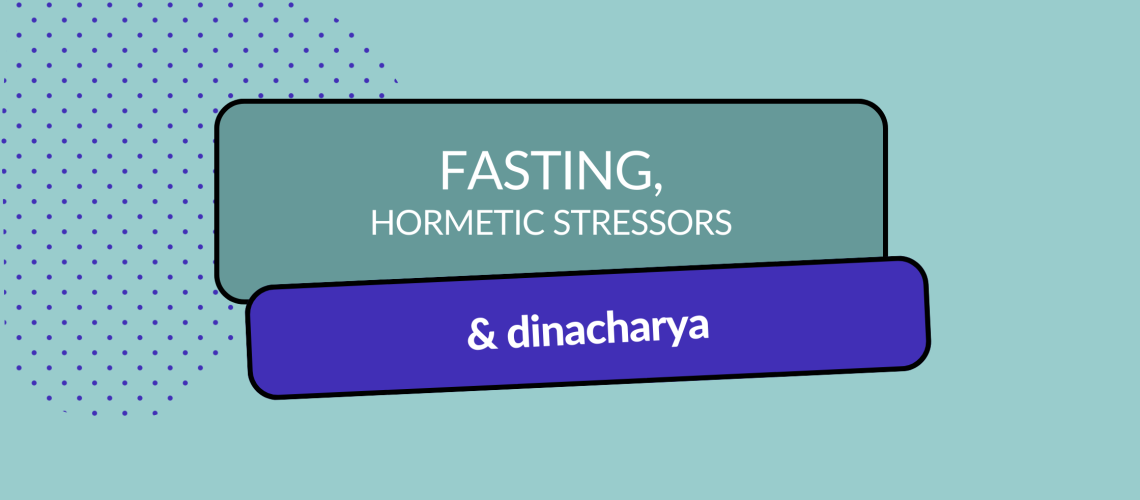Intermittent fasting is a very trendy topic, and I’ve written about it before. Intermittent fasting can be especially good if you’ve overindulged during the holidays. See, when we overeat, it affects our Agni, our digestive fire. It’s like putting a big log on a small fire – it won’t burn. And if we don’t digest our food properly, that opens the gates for ama, all kinds of imbalances and ultimately, diseases.
Today I wanted to talk about two Ayurvedic eating principles that may seem diametrically opposed to each other (and yes, there is a connection to intermittent fasting, but allow me):
- Eating at regular times each day
- Eating only during daylight hours
Eating at regular times each day
Eating at regular times each day is important for everyone, but especially for balancing Vata. It’s a part of dinacharya, or the Ayurvedic daily routine. Dinacharya prescribes us to start the day with a light breakfast to get our digestion going, eat a heavier, nutrient dense lunch, and finally have a light, easily digestible dinner. This is to best ignite and manage our digestive fire so we can properly digest our food.
When you skip breakfast, you skip the kindling that will help build your fire to the roaring stage. If you follow a skipped breakfast with a heavy meal at lunch, you’ll probably feel pretty sleepy and lethargic afterwards as your body is struggling to digest the heavy food on a low digestive fire.
Hormetic stressors
Also, when you constantly skip breakfast, you’ll quickly lose the beneficial hormetic stressor effect of the fast – your body will get used to it and your digestion will only fire up (but will be lower overall) around lunchtime. You can train your body to not be hungry in the morning, but that’s the exact opposite of what we want.
A hormetic stressor works only when it is not applied constantly, for instance a sleep fast can reset your sleeping pattern, but constantly sleep fasting (which is what a lot of us do, getting 1-3 hours less sleep a night than we should) will cause too much – and not beneficial – stress on the body.
Where a hormetic stressor can increase resilience of the body, constant stress (whether it is lack of sleep, overexercising, too much fasting for what your body can handle, cutting out whole food groups) will ultimately lead to disease.
Eating only during daylight hours
Our digestive cycle is synched to the cycle of the sun. Our digestion is low in the morning, highest at noon between 10am and 2pm (Pitta time) and after 2pm starts lowering again until the next sunrise.
Now that our days are getting shorter, it may still be dark at our usual breakfast time, and it is already dark at dinner time. Sooooo… do we move our meal times so that they can be during daylight hours, or do we stick to our eating schedule religiously?
If we move our eating times to only eat during sunlight hours, we are effectively fasting about 14 hours a day in the weeks leading up to and after the winter solstice.
The answer can be found in nature, and as always, depends. Each day the day shortens or lengthens by a few minutes. Ayurveda recommends not making any drastic changes to your diet and it makes total sense.
- going from a carb-heavy diet to a keto approach will give you the keto flu, a set of highly undesirable symptoms and causes huge stress on your body
- going from never fasting at all straight into a 16-8 fasting schedule will also mess with your stress hormones (and who messes with stress hormones will ultimately mess with all other hormones)
But if you follow the cycle of the sun, you’ll slowly adapt your eating schedule. You won’t cause stress on your body, and you can gradually increase your fasting time (but don’t skip breakfast!).
Why then did I say it depends?
– If you live close to one of the poles, you won’t have a lot of sunlight at all in winter, and you may have 24h sunlight in summer. Does that mean you can eat all day and all night in summer and eat only once a day in winter?
Ayurveda recommends having breakfast within 1-2 hours after waking up. If by this time there still is no sunlight, I would follow this rule instead, and try to eat your last meal as close to sundown as possible. If you only have a few hours of sunlight a day, I would eat at the same time each day, as much as possible around those daylight hours. In summer when there is plenty of daylight, it will be more important to stick to a regular eating schedule, so you get at least a 12h fast between dinner and breakfast.
– If you have a family, and/or a 9-5 office job, eating your last meal of the day close to sunset in the darkest months of winter is not practical at all.
Then it is especially important to eat a light, easily digestible meal for dinner, like a thick soup which will feel satisfying, and will not make you go to bed hungry.
Conclusion:
- Fasting can be beneficial for Agni, but never skip breakfast!
- Eat according to the cycle of the sun, unless you don’t get much of a sun cycle at all during peak winter or summer. Then eat as much as possible at the same time each day.
I hope this was useful and interesting to you.
Let me know what you think about this article!



